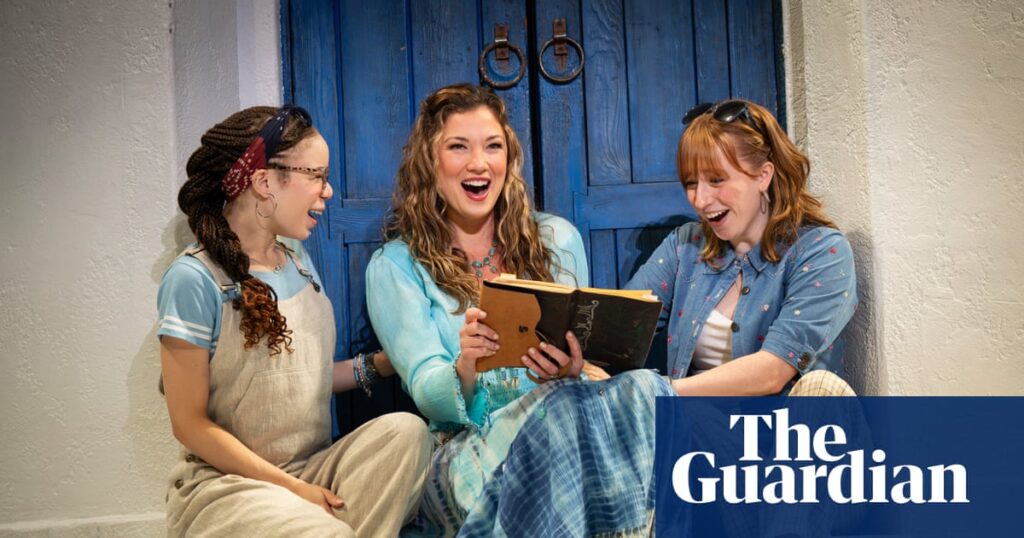The siren call comes from inside the house at 1634 Broadway: two plinking, instantly recognizable marimba notes, followed by a bubbly swell of melody and accompanied of course by Technicolor lights and the option of a triple-shot cocktail. Yes, Mamma Mia! is back on Broadway, once again providing much-needed escapism via idyllic Greek isle and the mind-clearing oeuvre of Abba.
The grandaddy – or, perhaps, erstwhile father – of the modern jukebox musical returned to the Winter Garden Theatre this month after a decade away from New York, much to the delight of pop music fans young and old charmed by its ebullient disco and gloriously ludicrous plot. It may be fair to say that it never really left; though the original closed after in 2015 after nearly 14 years on Broadway, Mamma Mia! still echoes loudly in musical theater as, arguably, the ultimate feelgood show – a “giant singing Hostess cupcake”, as the New York Times memorably put it in their 2001 review. An untold number of jukebox musicals have proliferated in its frothy wake, featuring the catalogs of everyone from Buddy Holly to Alicia Keys, Alanis Morissette to the behind-the-scenes pop maestro Max Martin, though never with quite the same level of success and enduring appeal as the originators of the term “Swedish hitmaker”. (Mamma Mia! is still running in London, where it first premiered in 1999, making it the longest-running jukebox musical in the West End, and the fifth-longest of all time.)
A 2008 film adaptation starring Meryl Streep and Amanda Seyfried – the highest-grossing Broadway adaptation until last year’s Wicked – cemented the musical, written by Catherine Johnson with music by Benny Andersson and Björn Ulvaeus, as a beloved slice of seriously unserious pop culture, a status not undone by its much less successful 2018 sequel, Mamma Mia: Here We Go Again. Judy Craymer, producer of the musical and its films, has confirmed that an improbable third movie is in development, with Seyfried in support and noted Abba fan Sabrina Carpenter eyed for a role.
And the music of Abba has morphed from possibly risible artefact of the disco era to an inescapable pillar of celebratory dancefloors, rebounding around the English-language soundscape like its palindromic name. Its placeless, magnetic tunes seem to have always existed, the Greek chorus of effervescent pop culture. The four members of Abba – Andersson, Ulvaeus, Agnetha Fältskog and Anni-Frid “Frida” Lyngstad – also live in perpetual youth as holograms in the popular Abba: Voyage virtual show in London.
At a nearly full matinee showing this month, a crowd that appeared to be mostly out-of-towners or original Dancing Queens greeted what has been billed as a “strictly limited” return engagement (until 1 February) with the enthusiasm of people who did not seem to realize that Mamma Mia! had ever been gone at all. Which is to say, happily, warmly and without extra fanfare. The production had the extra part covered; the second act overture, a medley of some of the hits-only show’s top hits, was so abruptly loud that I jerked bolt upright in my seat, and I am someone generally soothed by the sensation of hearing loss.
I managed to catch one of the final handful of Mamma Mia’s 5,773 performances during its original run, and though I remember the sensation of attending – enlivened, giddy, a little daunted – I managed to lose most recollection of the plot (it presumably also served triple-dose cocktails). Which is fine, as Johnson’s book is a nonessential and enjoyably ridiculous narrative seemingly invented to string together more than 20 Abba songs with their lyrics mostly unaltered. For those who also need a refresher: a few months before her wedding, 20-year-old Sophie (Amy Weaver) snoops through her mother’s diary and discovers three former suitors of her mother, the fiercely independent Donna (Christine Sherrill), who could each be her father. She invites them to the big day, at her mother’s self-run Greek taverna, though none know the real reason; Donna, a former disco singer, greets each of them (Rob Marnell, Jim Newman and Victor Wallace) with shock, a power drill and an especially spirited rendition of the titular track. In a matter of hours before the wedding, everyone seeks a very last-minute form of truth or former disco glory.
This new rendition is no less spirited than its predecessor, though a bit smaller in stature, being a touring company bound for Wilmington, North Carolina, in March. That’s most obvious in the show’s relatively simplistic set – noticeably less grand than your typical Broadway musical fare – and lack of a marquee name, though the performers are consistently solid (and consistently drowned out by the music; anything short of a full BFA belt did not rise over the orchestra).
But even a slightly scaled-down Mamma Mia! packs a punch – a walloping of foundational pop from start to finish. It’s little surprise that even in previews, the return show immediately became one of the highest-grossing shows on Broadway, up there with fellow musical juggernauts such as Hamilton, the Lion King and Wicked. By the time of its ecstatic second ending, a three-track encore that gets all the adult characters into galactic disco suits for a straight concert play of the hits, the whole crowd expectedly gets on its feet. Afterwards, an older woman behind me grabbed her friends’ wrists, arms overhead in a joint cheer, as if celebrating in a long-sought victory. And so goes the lure of Abba, a warm and welcome loop that never really ends.

